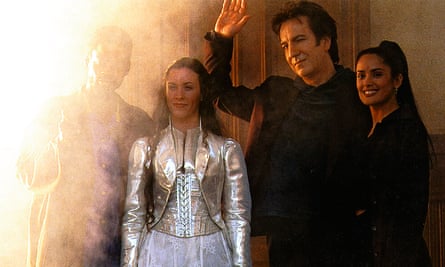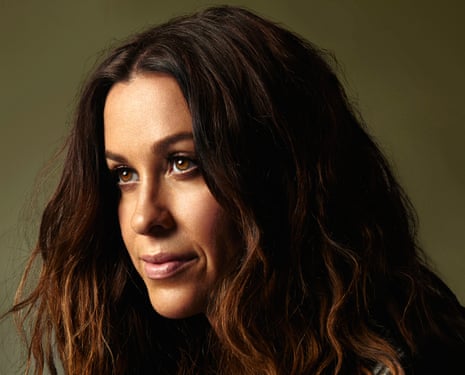Alanis Morissette remembers the moment she sensed that music – writing and performing songs, packing out stadiums, selling millions of records – might not be enough to get her point across. It was the mid-1990s and she was one of the biggest stars on the planet. Her album Jagged Little Pill was on its way to becoming a cultural touchstone, a distillation of anger and heartache that seemed to speak for a generation.
And yet, barely into her 20s, the Canadian queen of alt rock felt her message was not getting through. “I was made fun of on the cover of a magazine,” she recalls. “‘Stadium therapy rock’ or whatever it was. And a lot of people would write, ‘Oh, Alanis and her psychobabble’.” And, of course, there was criticism of Morissette’s use of the word ironic, to describe a black fly in your chardonnay and a no-smoking sign on your cigarette break.
Sitting in the conference room of her production company’s office in Brentwood, a swish part of Los Angeles, on a breezy, sunlit afternoon, Morissette can laugh about the I-word now. She recently recorded a duet with James Corden on the Late Late Show – an updated, very funny version of Ironic that went viral (“It’s like swiping left, on your future soulmate. It’s a Snapchat, that you wish you had saved”). But, for a long time, the song haunted her. “I’ve certainly had my ass kicked for a very long time over the malapropism of it all,” she smiles.

Dressed in runners, a grey T-shirt and sweater, and a hint of lipstick, Morissette is chatty and affable, laughing easily. She has impeccable posture, thanks to regular yoga, and is still recognisably the tousle-haired brunette who rocketed to fame in 1995 with You Oughta Know, a visceral ode to the pain and jealousy of breaking up.
Two decades on, at the age of 41, Morissette is moving to a new medium. She still writes songs, but is now also making podcasts, writing a book and, beginning next week in Guardian Weekend magazine, responding to readers’ letters in a new advice column. “I was getting bored with just one form,” Morissette says. “Songs are my favourite, let’s be honest. But there’s a limitation: it’s just three or four minutes. In a podcast, or in a column, there’s an intimacy and vulnerability on my part and the questioner’s part. We’re going for it, and there’s no hiding.”
The artist once labelled “an angry young woman” is, it turns out, a born agony aunt. The daughter of teacher parents, Morissette grew up Catholic in Ottawa, Canada, with an older brother, Chad, now a businessman, and a twin brother, Wade, who is a musician and yoga instructor. “It’s been the role I’ve played my whole life – family therapist,” she explains. “Parents, brothers, even extended family members, that was the role I took on, because I suppose I had this combination of intuition and empathy. I cut my teeth, basically, listening for a living.”

Morissette has spoken in the past about growing up feeling anxious and “mired in patriarchy”, leading to periods of depression and bouts of anorexia and bulimia. Even so, a precocious musical talent, dance lessons and appearances on the children’s variety show You Can’t Do That On Television attracted her to the limelight. She landed a record deal and in 1991 released her debut album, Alanis, a dance-pop mix, aged 17. It sold well, though she remained largely unknown outside Canada.
Moving to LA and collaborating with producer and songwriter Glen Ballard prompted a change of direction. When she released the LP Jagged Little Pill in 1995, her label, Maverick Records, considered it a quirky, arty album with limited commercial appeal. It became a phenomenon, selling 33 million copies worldwide, with songs such as All I Really Want, Hand In My Pocket and Ironic vaulting Morissette to stadium status at the age of 21. (More recently, the album soundtracked Steve Coogan and Rob Brydon’s drives in The Trip To Italy.)
Then came the rollercoaster of the 1990s, when mega-watt success and the pressure that came with it crashed into Morissette’s life. Hysterical fans mobbed her car, yanked her hair and left creepy notes in her hotel rooms, a period she now refers to as a “hailstorm of stimulation”.
She continued mining her emotions in subsequent albums, including Supposed Former Infatuation Junkie, Under Rug Swept and Flavors Of Entanglement, a cathartic response to a breakup with the actor Ryan Reynolds. The albums had respectable sales and reviews, but nothing like the feverish reception of Jagged Little Pill. Morissette also acted, taking eclectic roles on stage (The Vagina Monologues), film (Kevin Smith’s Dogma, in which she plays God) and television (Sex And The City; she kisses Sarah Jessica Parker in a game of Spin The Bottle).

About 10 years ago, she says, she decided to rebalance her life, after realising “I don’t want to be that woman who, at 70, has all these awards and is dying alone. So I decided I want to cultivate some real intimacies.” In 2009, she met Mario “Souleye” Treadway, a rapper and DJ, at a meditation gathering. Unlike her previous relationships, this one, she says, felt lasting. They married a year later in LA. “Anyone who meets us often marvels at how different we are,” she says, “but where we unite is our true north. We have this shared sense of marriage being this hotbed for healing. It’s a context in which we can grow and uplift each other, and catapult each other’s missions even further. It’s a very sacred crucible.” She pauses and gives a goofy grin. “We’re both traumatised humans, just trying to get it together.”
Their five-year-old son, Ever Imre Morissette-Treadway, has been “a total life-spinner”, she says, and she has tried to avoid repeating patterns from her own childhood. “For instance, being able accurately to reflect who he is, as opposed to those aspects that serve my needs. I’ve had great perfectionist issues since I was young, so it’s really lovely – because there’s just no possible way for me to be a perfect parent.”
She is happiest, she says, on her couch with her three dogs, Mario and Ever. That said, happiness can be overrated: “I don’t think that’s something we can have all the time. I’m not sure people want to feel happy so much as resilient and equipped. People enjoy watching sad movies for a reason.”

Anger and love “are the two hugest life forces”, Morissette believes. “I can tell when I’m angry. I feel it on a physiological level. I get flushed, I feel hot, my jaw clenches, my arms activate.” Anger is not necessarily bad, she adds: “That’s the anger that is out of control and irresponsible. But anger has a lot of different layers that are often overlooked. It gets a bad rap.”
These days, she soaks up books on psychology, relationships and spirituality, and has “copious” therapists. “I’m definitely a therapy girl – I think that’s quite obvious. I don’t want to say everyone should [have therapy], but do I think everyone might benefit from it? Yes. But I’m aware that a lot of people have great resistance to it: there’s an implication that if they go, there’s something inherently wrong with them, that they’re damaged or innately flawed. Which is not true.”

Once a symbol of youthful ire, now an advocate for therapeutic healing – I want to ask if that’s ironic, but I know Morissette has a tangled relationship with the word. “If somebody brings it up to shame me for the 450,000th time, it’s not the most pleasant experience,” she smiles. Neither she nor co-writer Ballard anticipated the song’s popularity or subsequent scrutiny. “So we thought, let’s not be precious about it.” She laughs. “But perhaps, in retrospect, we should have been.”
Collaborations with the likes of Justin Bieber, Taylor Swift and Demi Lovato – “these chronologically younger, talented creatures,” Morissette calls them – have introduced her to younger audiences. “It’s their way of honouring me, and my way of honouring the baton being passed,” she says.
Now Morissette is mining her past in a memoir-cum-self-help book, Perpetual Becoming, due out in May, which braids recollections with “hopefully, some hard-won wisdoms”. She has no shame about her own experiences, sexual or otherwise, she says, but is veiling certain details to shield others’ privacy: “It’s out of respect, not out of trying to hide.”
Might she make an exception, and finally break her silence on the breakup that inspired You Oughta Know, rumoured to have been actor-comedian Dave Coulier or even Matt LeBlanc? Those big, brown eyes widen. “No! It was my revenge fantasy. I’m all about revenge fantasy, but I’m not into the acting out of revenge. It’s really destructive.”
What’s the best advice Morissette ever received? She says it came not from a therapist but from a manager during her hurricane stardom years. “He said, ‘Just look down and imagine you’re walking on a train track, and put one foot on each piece of wood, and keep looking down and walking.’”
Do other people’s problems ever make her feel impatient? Could “therapy girl” ever dispatch someone with a brisk, “Pull yourself together”?
“A version of that, yes. When someone is dropping into victim or blame consciousness, I’ll yank on their bootstraps.” Morissette smiles. “Lovingly and firmly.”

Comments (…)
Sign in or create your Guardian account to join the discussion